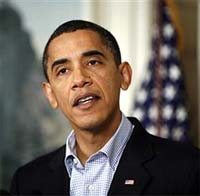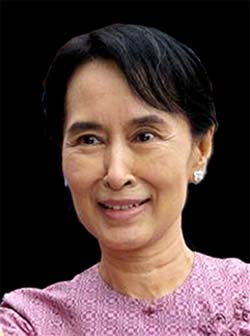Dec 16, 2025
Dec 16, 2025
 The US President, Barack Obama accepted a well deserved Nobel Peace Prize last week. While many would say that it was too early for the Nobel Committee to award the World’s youngest and most powerful head of state, the coveted Peace Prize, the Award for the first time seems to be a prospective one based on potential rather than past legacy which was evident with the extra mile to attain an agreement at Copenhagen on late Saturday night.
The US President, Barack Obama accepted a well deserved Nobel Peace Prize last week. While many would say that it was too early for the Nobel Committee to award the World’s youngest and most powerful head of state, the coveted Peace Prize, the Award for the first time seems to be a prospective one based on potential rather than past legacy which was evident with the extra mile to attain an agreement at Copenhagen on late Saturday night.
 Perhaps the greatest challenge to the President’s conscience should be the plight of another Noble Peace Laureate, Daw Aung Suu Kyi, detained in Myanmar for the past decade and a half. A victim of the regional power satraps disregard for the plight of hundreds like her in the country, there are hopes that President Obama will be able to provide her some succor through engagement rather than isolation of the military led government in the country. The initial prospects seem bright.
Perhaps the greatest challenge to the President’s conscience should be the plight of another Noble Peace Laureate, Daw Aung Suu Kyi, detained in Myanmar for the past decade and a half. A victim of the regional power satraps disregard for the plight of hundreds like her in the country, there are hopes that President Obama will be able to provide her some succor through engagement rather than isolation of the military led government in the country. The initial prospects seem bright.
President Obama commenced engagement with Myanmar on a positive note assuring the country of its territorial integrity and unity in a speech in Tokyo thus, "We support a Burma that is unified, peaceful, prosperous, and democratic. And as Burma moves in that direction, a better relationship with the United States is possible." This has put to rest long standing doubts in the Myanmar military junta that the West was fostering militancy on the periphery of the Irrawaddy, thereby destabilizing the nation per se.
Obama acknowledged that "despite years of good intentions, neither sanctions by the US nor engagement by others succeeded in improving the lives of the Burmese people." "So we are now communicating directly with the leadership to make it clear that existing sanctions will remain until there are concrete steps toward democratic reform," Obama declared.
Prime Minister of Myanmar General Thein Sein attended the 1st ASEAN - US Leaders Meeting at the Shangri-La Hotel in Singapore during November. Here there was a face to face contact with US President Obama, the first such direct communication of leaders of the two states for decades. President Barack Obama reportedly told Thein Sein that Suu Kyi should be released. Thein Sein failed to react to the request, but thanked the US for its new policy of engagement rather than isolation.
The change in stance towards Myanmar by Washington has come about due to the fresh diplomatic approach by President Obama after he has taken over in January where engagement of possible adversaries rather than isolation is deemed as a better strategy. Some in the establishment in fact feel that the US President has become so liberal that he has even diluted US sovereignty.
Prospects of a rapprochement between the US and Myanmar are thus being explored with Washington showing indications of willingness to give up its policy of diplomatic isolation of the military junta led government in Nay Pyi Taw. This followed hectic diplomacy for release of American renegade, John Yettaw after intervention of Senator Jim Webb after he was apprehended while making his way towards detained Suu Kyi in May 2009. The US trade lobby was also indicating that sanctions had not been working as lost opportunities were being picked up by Myanmar’s neighbors.
There were also indicators of the US using services of India to soften up the government in Myanmar given New Delhi’s perceived influence there. Strategic Analyst and noted commentator C Raja Mohan believes that India should be happy to see a rapprochement between the US and Myanmar as Delhi had recommended greater engagement rather than isolation of the regime for many years.
The second positive indicator from Myanmar is reciprocal action by Suu Kyi to talk to the junta without any pre conditions. She has long been accused of being rather intransigent on the issue. Aung San Suu Kyi requested a meeting with the military regime's top leader, in a letter dated November 11, "I would like to earnestly request permission to meet you so that we can talk about cooperating with the State Peace and Development Council in working in the interest of the nation," Suu Kyi wrote. Suu Kyi was conciliatory thanking the regime for allowing her to meet on November 4 with U.S. Assistant Secretary of State Kurt Campbell.
The political deadlock that began when the NLD won a 1990 general election may not end soon as the military is unlikely to allow the NLD or any other political party to come to power despite the elections scheduled in 2010.
Never the less these are seminal changes in the approach and the attitude of the leadership in Myanmar over the past few months. With Aung Suu Kyi open to dialogue with the junta a position which she had rejected earlier laying down a host of preconditions there is much hope in the days ahead that things will fructify in a positive direction.
A rapprochement between General Than Shwe and Aung Suu Kyi is expected but most unlikely given the manner in which the military regime functions in Myanmar. It would like to adopt a gradual rather than a path breaking approach of change towards its political adversaries as Suu Kyi. More over it would not like to be seen as changing in the face of pressure from the US and the West. This was the stand that it took when the UN also attempted to open the regime with the UN Secretary General making special efforts through his envoy Mr Gambari over the past few years. Thus it may be a gradual opening up with the elections in 2010 acting as the central event for change wherein the military junta would like to shape the same to its advantage.
US Myanmar engagement is thus a positive development. This is no doubt the overall impact of opening up diplomatic options by the Obama Administration which has led to greater confidence not only in Myanmar but other countries in the World.
After the elections scheduled next year in Myanmar, there are expected to be 25 percent of the nominees in the parliament from the Army. This would ensure that the Army will continue to have a defining say with the other representatives from parties which would be favorable towards it. Therefore it would be difficult for the political parties who are mustering support from the grass roots as the NLD to have some say in the affairs of the state till this dominance of the Army is overcome. This may take a few cycles of elections till a truly representative civil government takes post in the country. Thus progress in Myanmar may have to be measured slowly rather than fast tracked.
But President Obama needs to listen to his conscience on Daw Suu Kyi and seek her release without awaiting politics to unfold in the country. Will he have the time and inclination to do so remains to be seen?
20-Dec-2009
More by : Col. Rahul K. Bhonsle